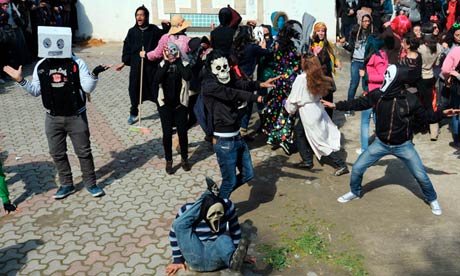You can probably guess what happened when Tunisian officials tried to clamp down on something as irreverent as the Harlem Shake. When the Islamist-led government reacted badly to a local manifestation of the global dance craze, it backfired in a big way. First, students in Tunis – who had initiated the country's renditions of the YouTube dance – hacked into the education ministry's website, making it wobble in time to the Harlem tune. And then, inevitably, where there was just one Tunisian Shake, hundreds more followed.
International media have pounced on this story, presumably because the symbolism is just too good to miss. The Harlem Shake, for those who haven't sifted through the viral video clips, is a 30-second meme with myriad riffs on one theme: a sole dancer is surrounded by disinterested friends who then erupt and join in with the wild gyrations, all set to a trap music track courtesy of the Brooklyn DJ Baauer. There are thousands of versions, but the Tunisian rendition is palpably politicised, with the dancers dressed as ultraconservative Salafis and Gulf emirs, and a few of the men appearing in their underwear.
Tunisia's government couldn't enforce its proposed ban, but the suggestion was enough to prompt students to bunk off class to film a bigger, more sarcastic Harlem Shake outside the education ministry. This is easy enough to fathom, as one student explained: "We are not able to express ourselves by talking, so we have chosen dancing to speak out. Plus, it's been banned now, which has energised us. It's exciting to defy the ban … it adds meaning to our actions."
Meanwhile, some Tunisian Salafis made it their mission to try and shut down the Shake – in some cases with physical as well as verbal attacks: one student in the coastal city of Mahdia needed 12 stitches to the head after one such assault.
It may look like a textbook tussle between pious conservatives and nonreligious youth: one side decrying an immoral western influence, the other striking back at imposed strictures. But this isn't as simple as secular students pushing back at religious control. If the Arab revolutions were, in part, a mass reclamation of public space, then what we're seeing in Tunisia now is partly a continuation of that. Inspiration for the uprisings across the Middle East, Tunisians – the people, not its ruling dictatorship – have long championed a unique ecosystem of religious freedom, with space for differences and tolerance. It seems like those features, which many Tunisians see as defining characteristics, are now being tested.
The trouble is that the government, a coalition led by the Islamist Ennahda party, stands accused of being biased towards the Salafi position in this street battle. When the education minister (who is not an Ennahda official) said that school-staged Harlem Shakes would be investigated, students wondered why he hadn't similarly pursued Salafi meetings held outside schools, or the replacement of one school's national flag with the black shahada favoured by conservative Islamist movements (as decoded here).
This suspicion goes wider, with the same coalition charged with doing nothing to stop the rise in political violence that has plagued Tunisia in the past year, culminating in the tragic killing of the opposition leader Chokri Belaid last month. Some Tunisians have responded to conservative religious attempts to control the streets with a surge of performances in public spaces. A new, post-revolutionary movement, Art Solution, has staged spontaneous public pieces, tagged: "I will dance despite everything." This is one example, from the old city of Tunis late last year. It looks like protest, spawned by Tunisia's revolution, has found new momentum and fresh appeal in forms of cultural expression. In that context, it makes sense that Tunisia's contribution to the eye-rollingly comic Harlem Shake craze should end up being so deeply political.









